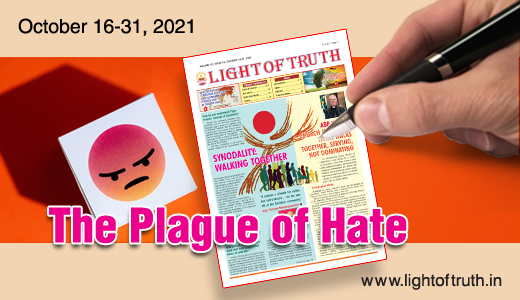Azadi ka Amrit Mahotsav Kolkata event honours four Clergymen
Pope Francis asks businesses to support working women: They’re ‘afraid to get pregnant’
Study: Christianity may lose majority, plurality status in U.S. by 2070
Indian politician declines Magsaysay Award under party pressure
Like John Paul II, Pope Francis heads to Kazakhstan during time of war

Raskolnikov in Dostoevsky’s Crime and Punishment has a dream during a grave illness that occurs just before his final change of heart and at the end of the novel. He dreams of a worldwide plague that affects people’s relationships with each other. “But never had men considered themselves so intellectual and so completely in possession of the truth as these sufferers, never had they considered their decisions, their scientific conclusions, their moral convictions so infallible. Whole villages, whole towns and peoples went mad from the infection. All were excited and did not understand one another. Each thought that he alone had the truth and was wretched looking at the others, beat himself on the breast, wept, and wrung his hands. They did not know how to judge and could not agree what to consider evil and what good; they did not know whom to blame, whom to justify. Men killed each other in a sort of senseless spite.” This is the kind of plague of hate and spite that we are now suffering. Hindutva protagonists hate the Muslims and other minorities, many Christians have started hating Muslims. So many Christians hate other Christians because they do not hold the same view. Hate is spreading far and wide. Perhaps Rene Girard will help us to interpret it correctly and go forward overcoming mimetic rivalry. Mimetic rivalry finds expression in accusations. An Adversary is created for any pestilence or a debilitating situation. The adversary is always collective, as in the tragedy of Sophocles. But unlike Oedipus, who finished by submitting, Job plunges into the debate frantically. Just like the personage at the centre of the psalms, he returns the accusation to his enemies. The desire to blame is discovered within the perception of the evil in itself.
“Mimeticism is the source of all man’s troubles, desires, and rivalries, his tragic and grotesque misunderstandings, the source of all disorder and therefore equally of order through the mediation of scapegoats.” We collaborate with the classical denial of violence by reading the myths and tragedies from the classical standpoint: “What no one ever realizes is that Oedipus could not be both the incestuous son and parricide and at the same time the pharmakos,” a cure and redemption. Thus Girard’s task is to “deconstruct” the accessory readings of such human situations. But Girard insists that this “deconstruction” began already in the transition from paganism to Christianity with the Passion of Christ. What is astonishing about the Gospels is that the unanimity of Christ’s accusers is not emphasized in order to bow before, or submit to, its verdict as in all the mythological, political and even philosophical texts, but to denounce its total mistake, its perfect example of non-truth.
Religion is becoming divisive. Insofar as the Christian text anticipates this revelation, it is, precisely, apocalyptic. It declares that no violence comes from God, but that violence comes entirely from the human agency. Its one nation against the other; brother against brother, one community against the other. There cannot be a simple humanistic reading of the Gospels. In other words, the Father cannot be reduced to some kind of psychological device. You can do this to some extent with Satan. You can call him a figure of mimetic desire. “A conversion in which you accept that you are part of the mimetic mechanism which rules human relationships, in which the observer acknowledges the fact that he himself is implicated in his observation. The distinction between an ‘authentic’ and ‘inauthentic’ desire is not always groundless, but when it coincides with the distinction between myself and the others, I think it is quite suspicious,” wrote Girard. The lynchers are always satisfied with their lynching. We have reached a point in history where we can no longer blame scapegoats. We must face our neighbours and declare unconditional peace. Even if we are provoked, challenged, we must give up violence once and for all.
“We know with increasing clarity that states are always based on something like the crucifixion—on the ability to kill to cure the community of disorder—or, in other words, a smart use of the scapegoat mechanism, which the leader himself triggers to reconcile his people against the scapegoat.” It is a bad imitation, but because it is a naive imitation, which doesn’t realize it is going to get into trouble—that the model is only a man and not God. Christian culture is the concern for victims, if our world were really to escape the influence of Christianity, it would have to renounce its concern for victims.
Leave a Comment